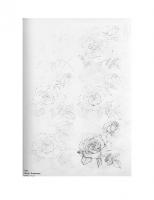Plants and the Environment (First Step Nonfiction) 0822586037, 9780822586036, 9780761339915
An engaging look at the ways that plants interact with people and animals.
282 106 2MB
English Pages 23 [28] Year 2008
Recommend Papers
File loading please wait...
Citation preview
by Jennifer Boothroyd
THIS PAGE INTENTIONALLY LEFT BLANK
by Jennifer Boothroyd
a Lerner Publications Company · Minneapolis
Plants need the environment. 2
Plants use land and water. 3
Plants get food and water from the soil. 4
Their roots grow in the soil. 5
The roots soak up water and nutrients. 6
Plants use animals and other plants. 7
Animals drop seeds. New plants grow from these seeds. 8
Insects carry pollen from plant to plant. 9
Some plants grow on trees. 10
Many plants grow in the shade of taller plants. 11
Plants adapt to their environment. 12
A cactus holds water in its big trunk. 13
Some trees lose their leaves in the fall. 14
Some plants have large leaves to get more sunlight. 15
Thorns protect some plants from being eaten by animals. 16
Plants use the environment in many ways. 17
Earth’s Shrinking Forests
Where forests are now Where forests used to be
18
Source: UNEP-WCMC 2000
19
Shrinking Forests The world’s forests are getting smaller. Sometimes nature causes forests to shrink. Storms can knock down trees. Usually people cause forests to shrink. We cut down trees for wood and paper. We clear forestland to make farms and neighborhoods. Luckily, people are changing how they treat forests. We recycle paper, so fewer trees need to be cut down. Companies that cut down trees plant new ones. These changes can stop the forests from shrinking. 20
We Need Forests • Wood is used for fuel, paper, furniture, and homes. • Trees help make oxygen. Oxygen is a gas in the air. All animals need oxygen to breathe. • Millions of plants and animals live in forests. • Roots hold soil in place so the rain doesn’t wash it away. • People enjoy camping and hiking in forests. 21
Glossary adapt – change
environment – the land, water, air, weather, and living things of the earth nutrients – elements in soil that plants need to grow and live pollen – yellow dust in a plant used to make seeds soil – the top part of the ground
22
Index adapt – 12 animals – 7, 8, 16, 21 pollen – 9 seeds – 8 soil – 4, 5, 6, 21 water – 3, 4, 6, 13
23
Copyright © 2008 by Lerner Publishing Group, Inc. All rights reserved. International copyright secured. No part of this book may be reproduced, stored in a retrieval system, or transmitted in any form or by any means—electronic, mechanical, photocopying, recording, or otherwise—without the prior written permission of Lerner Publishing Group, Inc. except for the inclusion of brief quotations in an acknowledged review. The images in this book are used with the permission of: PhotoDisc Royalty Free by Getty Images, pp. 2, 3, 5, 6, 8, 9, 11, 13, 17, 22 (second from top, middle, second from bottom); © RoyaltyFree/CORBIS, pp. 4, 22 (bottom); © Richard Eastwood/CORBIS, p. 7; © Vanessa Berberian/Stone+ /Getty Images, p. 10; © Steve & Ann Toon/Robert Harding World Imagery/Getty Images, pp. 12, 22 (top); © Laura Ciapponi/Photonica/Getty Images, p. 14; © James Balog/Aurora/Getty Images, p. 15; © Stephen St John/National Geographic/Getty Images, p. 16; © Laura Westlund/Independent Picture Service, pp. 18-19. Front cover: © Taylor S. Kennedy/National Geographic/Getty Images Lerner Publications Company A division of Lerner Publishing Group, Inc. 241 First Avenue North Minneapolis, MN 55401 U.S.A. Website address: www.lernerbooks.com
Library of Congress Cataloging-in-Publication Data Boothroyd, Jennifer, 1972Plants and the environment / by Jennifer Boothroyd. p. cm. — (First step nonfiction. Ecology) Includes index. ISBN 978-0-8225-8603-6 (lib. bdg. : alk. paper) 1. Plant ecophysiology—Juvenile literature. 2. Plant ecology—Juvenile literature. I. Title. QK717.B66 2008 581.7—dc22 2007007810 Manufactured in the United States of America 1 2 3 4 5 6 – DP – 13 12 11 10 09 08
eISBN-13: 978-0-7613-3991-5
THIS PAGE INTENTIONALLY LEFT BLANK




![Enzymes in the Environment (Books in Soils, Plants, and the Environment) [1st ed.]
0824706145, 9780824706142, 9780585403618](https://ebin.pub/img/200x200/enzymes-in-the-environment-books-in-soils-plants-and-the-environment-1stnbsped-0824706145-9780824706142-9780585403618.jpg)
![Beyond Stories : Young Children's Nonfiction Composition [First Edition]
9781317922438, 9781930556409](https://ebin.pub/img/200x200/beyond-stories-young-childrens-nonfiction-composition-first-edition-9781317922438-9781930556409.jpg)




